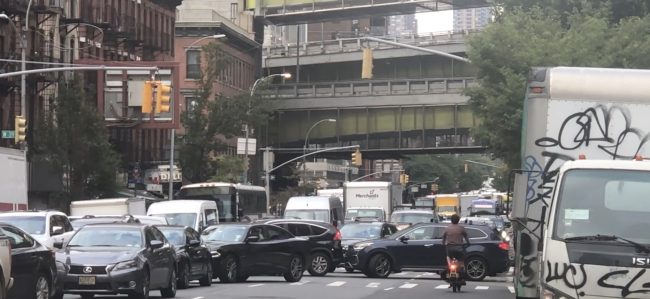
In our CD4 district, New Jersey vehicular traffic has returned with a vengeance to pre COVID level with longer peak hours, gridlock and very bad air quality.
According to the New York Times , total registrations in the city for passenger vehicles reached 2.2 million in 2021 up from 1.9 million in all of 2019, according to state records. Traffic snarls fueled by a plunge in transit use and car pooling, soaring car ownership and a surge in delivery trucks trying to keep up with an e-commerce boom. The skyrocketing traffic is not just maddening to drivers; it has made the city’s streets deadlier for pedestrians and cyclists — traffic fatalities have risen to their highest level in nearly a decade — and contributed to higher levels of climate-changing emissions.
The best – and possibly only – solution is congestion pricing which, when implemented in London, reduced traffic by 20% and fatalities by 14% and significantly improved air quality.
The proposal for Manahttan below 60th Street does exempt drivers with a yearly revenue lower than $ 60,000, as well as persons with disabilities and emergency vehicles. The toll applies only once per day.
Benefits for drivers are many:
- Significant travel time savings and reliability for deliveries
- Increase availability of parking space in the CBD instead of risk increased parking fees, while there are no impact on parking in adjacent districts
- Faster, reliable buses, emergency vehicles
In order to get the benefits of congestion pricing for our district, where 80% the population does not drive, two measures must be adopted:
- New Jersey drivers must pay the full congestion pricing toll . The volume of New Jersey vehicles must be reduced, not only to eliminate constant gridlock and terrible air quality, but to facilitate the Bus terminal expansion with an increase in buses in the Lincoln Tunnel.
- New Jersey drivers must pay the full congestion pricing toll e given to municipal employees or even to electric cars. Potentially a surcharge should be applied to SUVs who occupy much more space and pollute more than traditional vehicles.
Upcoming Public Hearings
Thursday, August 25, 2022, 5-8 p.m. (sign up to speak or request services) [334 sign ups]
Saturday, August 27, 2022, 10 a.m.-1 p.m. (sign up to speak or request services) [74 sign ups]
Sunday, August 28, 2022,1-4 p.m. (sign up to speak or request services) [55 sign ups]
Monday, August 29, 2022, 1-4 p.m. (sign up to speak or request services) [72 sign ups]
Tuesday, August 30, 2022, 5-8 p.m. (sign up to speak or request services) [63 sign ups]
Wednesday, August 31, 2022, 10 a.m.-1 p.m. (sign up to speak or request services) [55 sign ups]
Locations: Hearings will be virtual via Zoom and livestreamed at mta.info/CBDTP.
Those who want to participate in the hearings may do so:
By PC/Tablet/Smartphone:
Join link: https://mta.zoom.us/j/82606738045
Webinar ID: 826 0673 8045
By Phone:
Dial-in: 1-888-788-0099 (toll-free)
Webinar ID: 826 0673 8045, #, #
It is requested, but not required, that those wishing to speak sign up by 7 p.m. the previous day at mta.info/CBDTP or by calling the Public Hearing Hotline at 646-252-6777.
